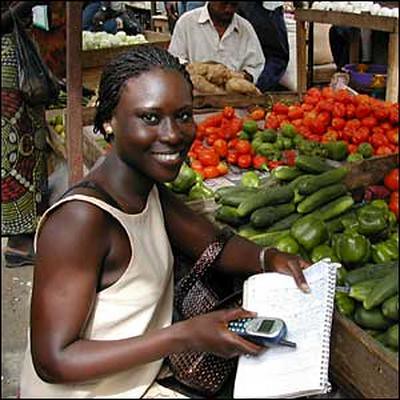Promotion and more at Farmers Markets

Velentin Alvarez and his wife, Maria, shop for produce with their children Cesar, 6, and Maria Euadalope, 3, at the West Chester Growers' Market. Photo from the Philadelphia Inquirer (11/13/2003).
 Joy Beeler of the Ukiah Main Street writes: I would like suggestions from any of you that host Farmers Markets with cooking demonstrations on how you set up sponsorship/chefs/etc.
Joy Beeler of the Ukiah Main Street writes: I would like suggestions from any of you that host Farmers Markets with cooking demonstrations on how you set up sponsorship/chefs/etc.Richard Layman replies:
I think a lot of time farmers markets efforts are a little too disconnected from the Main Street model's promotion of independent businesses. I am starting to recognize that Promotions Committee point #3 (retail business promotion, in addition to image development and special events and programming) is best addressed by doing lots of cross-promotion between businesses and activities, and ensuring that events and programming like Farmers Markets maximize cross-promotion activities with the local businesses and stakeholders in the commercial district.
So I have these recommendations:
1. Try to get local food store owners participating in chef demonstrations, particularly ethnic owners. It will introduce the store owners to new patrons and potential customers to new cuisines. E.g., the local supermercado can show how to cook various Latino dishes, etc.
2. Try to get local restaurants, AND institutions (local college food service director, hospitals, local school districts, big churches, others) to do chef demonstrations--not just the local restaurants. This is a way to extend your MS relationships to institutions in your community.
3. Try to get the food editor from the local paper(s).
4. If there are food-related businesses in your greater service area, they can participate. I.e., there is a guy from College Park, an African-American entrepreneur, http://www.unclebrutha.com/, who samples his sauces at Eastern Market, and at the Brookland Market by Catholic University both Uncle Brutha and another woman who promotes sparkling non-alcoholic beverages from a Virginia producer participate, etc.
5. How can you partner with cooperative extension? Food-agriculture organizations in your state? 4-H?
6. Cookbook author demonstration-signings in conjunction with local bookstores.
7. Do one or more ethnic or food festivals in association with your market... The Carytown (Richmond, VA) Watermelon Festival is a big deal and a regional draw. Etc.
8. Pumpkin and apple pie baking contests for people in the community, with products bought from your market. (Or whatever you grow regionally.)
9. Are there agri-tourism opportunities in your area that provide promotional connections and links? Like the boost in patronage that has come from the movie "Sideways"? Can a local winery do tastings? Etc. (Remember that microbreweries are often brewing sodas now, because they don't have to be fermented for a long time like beer, you can do tastings...)
Also, don't forget the Project for Public Spaces workshop, "How to Create Successful Markets" May 19-20th in New York City.

______________________
Bob Wilson, director of Program Services for the Mississippi Main Street program offers this advice:
The Crescent City markets are 4 different markets in different locations at different times of the week in New Orleans. They resulted from a project sponsored by Loyola. Of course you are dealing with New Orleans and there are chefs-a-plenty there but you can apply the principles to your area as well. You will find links to information about Loyola, their Economics Institute, Chefs & Vendors, etc., etc. You can also sign up for their weekly newsletters which are excellent. Loyola has consulted with several markets in our area but I'm sure they would be glad answer questions and provide some basic info. Good Luck!
Richard Layman says:
The Crescent City site is great, and it has a link to an interesting economic impact model called the "Sticky Economy Evaluation Device" which they describe as an "economic measurement tool for public markets" that is worth checking out.



0 Comments:
Post a Comment
<< Home